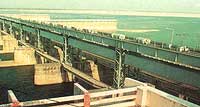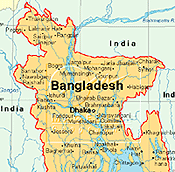|
 Paradoxically,
Bangladesh''s creeping estrangement from India is rooted
in an attempt by its political leaders and elite to shield
their secular heritage from the creeping Islamisation
of their society. Over decades, millions of its workers
have returned from the Middle East infected by the austere
Sunni and Wahabi Islam they found practised there. The
percolation of this imported Islam into Bangladeshi society
has turned the Jamaat-i-Islami into a potent political
force, and given rise to a still-small terrorist movement
that is targeting communist, and other ''heretical'' elements. Paradoxically,
Bangladesh''s creeping estrangement from India is rooted
in an attempt by its political leaders and elite to shield
their secular heritage from the creeping Islamisation
of their society. Over decades, millions of its workers
have returned from the Middle East infected by the austere
Sunni and Wahabi Islam they found practised there. The
percolation of this imported Islam into Bangladeshi society
has turned the Jamaat-i-Islami into a potent political
force, and given rise to a still-small terrorist movement
that is targeting communist, and other ''heretical'' elements.
The
fear that these fundamentalists will succeed in enlisting
Bangladeshi nationalism to overwhelm its secular polity
is the main reason why every government in Dhaka has felt
obliged, at least in public, to adopt a less than co-operative
attitude to India. This was as true of the Awami League
government under Sheikha Hasina as it is of the BNP government
of Begam Zia. In 1997 the Awami League government agreed
to close down the ULFA camps in Bangladesh, but after
closing down around 50 of them, found that it could not
go any further because of determined resistance from within
the Bangladesh army. Since 2001 most of these camps have
been reopened. Bangladeshi sources confirmed to me that
the majority are permanent encampments whose presence
is known to their government and security forces.
 If
cooperation with India is likely to be depicted as both
a surrender of national sovereignty and a betrayal of
Islam, then withholding it becomes one way of preventing
the fusion of the two ideas. This accounts for the steady
accumulation of unresolved issues. If
cooperation with India is likely to be depicted as both
a surrender of national sovereignty and a betrayal of
Islam, then withholding it becomes one way of preventing
the fusion of the two ideas. This accounts for the steady
accumulation of unresolved issues.
Today
six of these bedevil Indo-Bangladesh relations:
- ULFA''s
camps inside Bangladesh''s borders;
- Illegal
migration of millions of Bangladeshis to India in search
of security or work;
- India''s
decision to fence the border and the host of associated
issues it has raised;
- Bangladesh''s
non-tarriff barriers on imports from India;
- Bangladesh''s
failure to implement its commitment to permit overland
and riverine transit for Indian goods to and through
its territory, and
- Its
reluctance to harness the abundant river waters of the
eastern region jointly with India to generate power,
augment the irrigation potential and limit the damage
done by floods.
On
each of these, Indian proposals and requests are met with
vague assurances but little follow up.
To give two current examples, India submitted a draft
extradition treaty to Bangladesh more than a year ago.
Such a treaty would enable India to ask for the extradition
of ULFA leaders apprehended by the Bangladesh authorities,
and Bangladesh to ask for the extradition of criminal
gang bosses who operate from secure bases in Calcutta.
But to date Bangladesh has neither signed it nor asked
for a further discussion of its clauses. A rail link has
also finally been established between Bangladesh and India
and a trial run is scheduled for the near future. But
it remains to be seen whether this will result in regular
transit links between Bangladesh and India.
A
striking feature of all these outstanding issues is that,
in stark contrast to the Kashmir dispute with Pakistan,
none of them involves a conflict of vital interests. Most
are of the kind that arise between all countries that
share a common border, and are resolved with little fanfare
in other parts of the world. Their sheer ordinariness
has promoted the belief among officials in Bangladesh,
that they are at least partly a product of the prolonged
neglect of Bangladesh by India. One visit by an Indian
Prime Minister to Bangladesh, they point out, will resolve
most if not all of these issues.
 Many
members of the intelligentsia also urge India to give
preferential, or free, market access to Bangladeshi consumer
goods. This will help Bangladesh to reduce its large trade
deficit with India and make it easier for it to lift various
non-tariff barriers to imports from India. In the longer
run it will also create a strong businessmen''s lobby in
favour of closer relations with India, which would act
as a counterweight to the fundamentalist forces in the
country. Many
members of the intelligentsia also urge India to give
preferential, or free, market access to Bangladeshi consumer
goods. This will help Bangladesh to reduce its large trade
deficit with India and make it easier for it to lift various
non-tariff barriers to imports from India. In the longer
run it will also create a strong businessmen''s lobby in
favour of closer relations with India, which would act
as a counterweight to the fundamentalist forces in the
country.
Both
suggestions make eminently good sense, but the improvement
of relations is likely to prove short-lived if it is not
accompanied by a fundamental shift in each country''s perception
of the other. India needs to take the initiative in doing
this.
By
far the most important change is a genuine understanding
of why Bangladesh feels so helpless and vulnerable in
its relations with India. Significantly, this feeling
does not arise from any perception of military threat:
In all the discussions one has had over the years with
Bangladeshis, not once has anyone voiced the fear that
India will intervene militarily in Bangladesh to have
its way. This is the best proof that Indians can ask for
that Bangladeshis have not forgotten, and are not likely
to forget, how they obtained their independence.
The
feeling arises from the way in which its future is inextricably
intertwined with that of India. All of its rivers flow
out of India, and India is the natural market for most,
if not all, of its products. Bangladesh is therefore affected
by virtually every decision that India takes in fields
as diverse as ecology, energy, and economic policy. But
it has absolutely no capacity to modify them in order
to minimise their impact upon its economy.
What
is worse, it is not only India''s actions but its inaction
that affects Bangladesh. One example will suffice to illustrate
this. Nepal is not the only country that got cut off from
its natural market when India adopted an autarchic model
of economic development. Bangladesh suffered almost as
badly. It is of course true that the umbilical chord was
cut first by the Partition and the extreme hostility that
erupted between Pakistan and India. But in 1971, when
Bangladesh became free, its economy suffered a second
severe blow, for it lost both its markets and sources
of foodgrains and raw materials in West Pakistan. India
could have cushioned the shock if it had given Bangladesh
immediate, free access to its markets. But in the days
of industrial licensing, import bans and sky-high tariffs,
such largesse was unthinkable. India''s failure to perceive
and respond to Bangladesh''s needs cost that country almost
two decades of lost growth.
 But
to most Bangladeshis, it is Farakka that symbolises their
inability to control their destiny. Bangladesh admittedly
has a superabundance of water. But nearly all of it comes
from a single three-month monsoon that regularly causes
the Brahmaputra to flood a third of the country. To grow
a second and third crop in order to feed its growing population,
Bangladesh is critically dependent upon irrigation. It
is therefore adversely affected by almost any hydel project
on the Ganges or one of its tributaries, that reduces
the flow of water in the river as it enters Bangladesh. But
to most Bangladeshis, it is Farakka that symbolises their
inability to control their destiny. Bangladesh admittedly
has a superabundance of water. But nearly all of it comes
from a single three-month monsoon that regularly causes
the Brahmaputra to flood a third of the country. To grow
a second and third crop in order to feed its growing population,
Bangladesh is critically dependent upon irrigation. It
is therefore adversely affected by almost any hydel project
on the Ganges or one of its tributaries, that reduces
the flow of water in the river as it enters Bangladesh.
Farakka
has halved the water available to Bangladesh from the
Ganges, but what is even worse, India took the decision
to build the barrage without first consulting Bangladesh,
and overrode every one of its objections. What is to stop
it from doing so again and again?
This
fear was confirme last year when the Vajpayee government
announced its ambitious river linking project without
even a token discussion with Bangladesh, despite the fact
that it involved building a link canal from the Brahmaputra
to the Ganges and up to six dams and barrages on the tributaries
of the former in Assam and NEFA.
The
reactions to the project in Bangladesh show that if there
is a single issue that could drive the two countries irrevocably
apart, it is not trade, transit rights or access to markets.
It is water.
The
argument made by Indians that Bangladesh too stands to
gain from projects that control floods and augment lean
season flows in all rivers misses the basic cause of Bangladesh''s
fear and resentment. This is it''s lack of control over
its destiny. India can only reassure it on this score
if it creates an institutional arrangement that gives
Bangladesh
a share in the decision making process. This requires
a small surrender of sovereignty but the political and
economic gains that will accrue from it will far outweigh
the loss.
Related
article:
*
The author, a noted analyst and commentator, is a former editor of the
Hindustan Times, The Economic Times and The Financial
Express, and a former information adviser to the prime minister of
India. He is the author of several books including, The Perilous Road
to the Market: The Political Economy of Reform in Russia, India and China,
and Kashmir 1947: The Origins of a Dispute, and a regular
columnist with several leading publications.
|